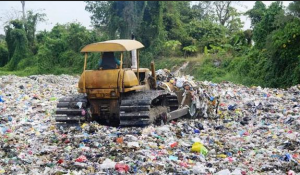Wasting Without Knowing
Food waste accounts for copious amounts of wasted energy in the United States. In order to break this habit, a strong, individual effort has to be put forth. Most of the time, we have no idea when we are wasting food and this is why it’s a tough habit to break. The average person does not know about the effects of wasting food. They may not think anything of it because their contribution to the overall food waste on the planet is too minute to make a difference. However, the issue is when millions of people think in this manner. To be fair, no one thinks about the effects of food waste when having lunch with friends or family. I came to realize that in order to break this habit I would have to constantly remind myself of the images of packed landfills such as the one pictured below to help me think more on a global scale.
“98 million tons of edible food is wasted a year..( Kelleher, M.K., Robins, J. R., (2013))” It was frightening to read this. I can’t even begin to think about what 98 million tons of trash would look like. To think that all of it is edible food to me, shows how uneducated our society is about this issue. The article I found talked about how big time companies now like Coca cola, Nestlé, and Tesco for example, “have been committed to reducing food and drink waste by 1.1 million metric tons by 2015(Kelleher, M.K., Robins, J. R., (2013)).” By cutting down on food waste, the less waste there will be in the landfills. This is a good thing when you consider the fact that the food that decomposes in these landfills creates methane gas, which is also harmful to the environment even more so than carbon dioxide.
I took the same approach this past week to eliminate any excess food waste I had. I had to really focus and determine what I thought would be enough to satisfy my hunger, but at the same time not get more food than I could handle. I made sure to only get what I knew I could eat. If that wasn’t enough and I was still hungry after finishing my plate, then I would allow myself to return to get more to eat. I ran into a couple barriers this past week that made it difficult to stay on task. One of these barriers was being tired. I ran into this barrier normally at breakfast and dinner. I was tired and I wasn’t thinking about my food waste, only about how I was going to go about my day or how tired I actually was. The second barrier I ran into was eating with friends! I came to realize that talking to your friends easily distracts you from realizing whether or not you are wasting food. When I was talking to my friends was when I was wasting the most food.
To dig our selves out of this hole, it’s got to start with raising the awareness of the problem at hand. We’ve got to start somewhere and I think using the attitude-behavior approach to voice this issue and make it visible to the public would be a great start.
References:
Kelleher, M.K., Robins, J. R., (2013). What is Waste Food? BioCycle, 54(8), pgs. 36-39
(from ebscohost.com)
Image reference:
http://www.livescience.com/32786-what-happens-inside-a-landfill.html

Leave a Reply